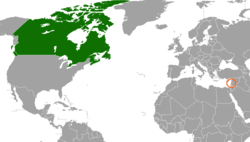History
The first Lebanese migration to Canada took place in 1882 when Lebanon was still part of the Ottoman Empire. [1] In 1946, soon after obtaining independence from France, Lebanon opened a consulate in Montreal. [2] In 1949, the consulate was upgraded to a consulate-general. In 1954, Canada recognized and established diplomatic relations with Lebanon. [2] In 1958, both nations opened embassies in each other's capitals, respectively. [2]
Between 1975 and 1990, Lebanon entered into a civil war between various religious factions in the country. In 1985 Canada closed its embassy in Beirut. During the war, Canada received thousands of Lebanese refugees which made Lebanon the largest Arab diaspora community in Canada. [1] Canada re-opened its embassy in Beirut in 1995. [2]
There are approximately 190,000 Canadians of Lebanese descent in Canada and 45,000 Canadians residing in Lebanon. The evacuation in 2006 during the Israel–Hezbollah War of Canadians from Lebanon was the largest in Canada's history and spoke of the importance of this diaspora community. [2]
Since 2016, Canada has contributed almost US$250 million to support Lebanon's stability and resilience as it copes with hosting the more than 1.5 million Syrian refugees that have been added to the country's already existing refugee population, which also includes Palestinians, Iraqis and Kurds. Canada has increased its diplomatic presence in Lebanon, also in response to the crisis. [3]
Trade
In 2018, total trade between Canada and Lebanon totaled US$150 million. [3] Canada's main exports to Lebanon include: vehicle parts, agri-foods (in particular wheat and legumes), pharmaceuticals and other industrial and consumer goods. Lebanon's main exports to Canada include: preserved food, beverages, coffee and spices, olive oil and sugar and confectionery. [3]
This page is based on this
Wikipedia article Text is available under the
CC BY-SA 4.0 license; additional terms may apply.
Images, videos and audio are available under their respective licenses.


